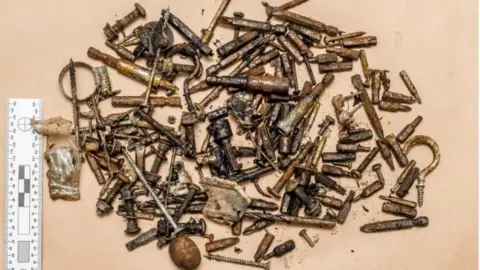Why is it so easy to buy bomb ingredients?
 PA
PAAn 18-year-old man has been convicted of planting a bomb on a London Tube train. Why is it so easy for people such as Ahmed Hassan to get hold of the ingredients they need to carry out an attack?
The ready availability of the materials needed to make a bomb is a growing problem in the UK and Europe.
Of particular concern is the ease with which would-be attackers can obtain the ingredients for the high explosive triacetone triperoxide (TATP).
It has featured regularly in attacks in recent years, including the Paris attack of 2015, the Brussels bombs in 2016 and the Manchester bomb in May 2017.
Dozens have died as a result of its use.
In September 2017, Ahmed Hassan detonated a device, also made from TATP, on a crowded Tube train at Parsons Green in London.
Although nobody was killed, victims spoke of "a furnace engulfed in flames" and "shards of glass flying through the air".
Thirty people were injured: some badly burned and others injured in a "stampede" as they fled in fear and panic.
 Met Police
Met Police Perhaps the biggest challenge is how to stop would-be attackers misusing materials that are widely available and have many other, legitimate, uses.
TATP includes hydrogen peroxide - which is found in hair bleach and some disinfectants - and another chemical also found in common household products.
Hassan's trial heard that he had packed his bomb with metal items bought from Aldi and Asda and had hydrogen peroxide delivered to a friend's address to avoid suspicion.
Another ingredient was bought from Amazon.
It is worth stressing that the explosive properties of these materials are widely known and the government has made a point of highlighting this.
It hopes suspicious purchases - such as the vast quantities of hair bleach bought before the 7 July attacks of 2005 - could, in future, be spotted.
However, while TATP has been shown to be deadly, it is not a reliable explosive and does not always work predictably - as highlighted by the fact that the device at Parsons Green only partially detonated.
It is both sensitive and prone to accidental detonation, making it a dangerous choice for perpetrators of attacks to work with.
It could be that TATP is being used more often because of successful controls limiting the availability of materials needed to make other types of explosive device.
Among these is ammonium nitrate, a chemical compound most commonly found in fertiliser.
 Getty Images
Getty ImagesMore stable than TATP, it also used to be easy to get hold of in the UK because of its commercial uses.
In the 1970s, ammonium nitrate was widely used by the IRA to make explosive devices.
It is still used extensively in Pakistan, Afghanistan, and by the Islamic State group in Syria and Iraq, where explosive devices blight communities.
However, in Europe its supply is now extensively monitored - a task made easier by the fact that it is available from a comparatively small number of sources and used for a limited number of legitimate commercial purposes.
Regulations have also been introduced around the sale of materials that can be used to make TATP.
In the UK, hydrogen peroxide - and the other key ingredient in TATP - are among the many substances to appear on the list of regulated, or reportable, substances.
A licence is required from the Home Office for anyone wishing to acquire, import, possess, or use these materials.
Shops and businesses are required to report suspicious transactions and to inform police of any thefts.
But the continued use and prevalence of TATP suggests that the controls are either proving difficult to enforce, or are not stringent enough to effectively monitor materials used so commonly in everyday life.
As the ingredients for TATP have many uses and are distributed and sold through many suppliers, it is very difficult to monitor who is buying them and smaller vendors may not even realise that these products can be used to make explosives.
Of course, controlling the supply of bomb-making ingredients is not an issue for individual countries alone.
 Getty Images
Getty ImagesRegulating the flow of materials across borders is key to ensuring chemicals don't get into the wrong hands, and international cooperation is vital.
This was illustrated in Afghanistan when, in 2012, an in-country ban on ammonium-nitrate-based fertilisers was rendered ineffective by the continued ready availability of fertiliser in neighbouring Pakistan.
Another challenge is limiting the exchange of information and instruction on bomb-making available on the internet and social media.
There is no perfect solution to this problem, and tightening restrictions does not provide a silver bullet.
Rather, it is like squeezing a balloon.
Tightening restrictions in one area may lead to a bulge in use of different tactics - often in another area.
For example, the use of vehicles as a weapon in recent attacks may be in part due to difficulties in obtaining explosive materials.
But continued, coordinated and sustained pressure remains essential.
This, it is hoped, could limit the harm caused by homemade explosives.

About this piece
This analysis piece was commissioned by the BBC from Henry Dodd, the manager of international security at Chatham House. Follow him @Wilfdodd.
Chatham House, the Royal Institute of International Affairs, describes itself as an independent policy institute helping to build a sustainably secure, prosperous and just world.

Edited by Duncan Walker
